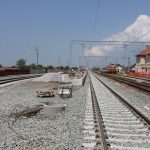
The Government of Croatia has adopted a Decision on the continuation of financing the reconstruction and construction of the second track of the Hrvatski Leskovac – Karlovac rail line, which is part of the 229 km M202 Zagreb main station – Rijeka mainline, on the corridor RH2 and is also part of the section Rijeka – Zagreb – Budapest on the Mediterranean corridor.
The second phase of the project has been approved by the Ministry of the Sea, Transport and Infrastructure that assumes obligations from the state budget from 2025 to 2030 helping the conclusion of a grant agreement.
The Decision regulates the continuation of financing the implementation of the project through the Competitiveness and Cohesion Programme 2021 – 2027. Its worth to be noted that the project was previously co-financed through the Operational Programme Competitiveness and Cohesion 2014 – 2020 and meets the conditions and requirements for the phase II which is estimated at EUR 424 million.
In December 2019, HŽ Infrastruktura signed a grant agreement with Ministry of Transport and Central Finance and Contracting Agency (CFCA) for co-financing from the Cohesion Fund. EUR 458.5 million was the value of the agreement and EUR 361.1 million is the total eligible costs of the project of which EUR 307 million representing 85% co-financing through the Operational Programme “Competitiveness and Cohesion” 2014 – 2020 (OPCC). The remaining EUR 54.2 million representing15% is the co-financing from the state budget.
In addition, the project secured a EUR 55 million financing from the European Investment Bank in 2020.
The Decision also includes a granting consent to the Ministry of Finance to conclude a tripartite agreement on the regulation of mutual obligations and claims with the rail infrastructure manager HŽ Infrastruktura and the Centre for Restructuring and Sale (CERP). A similar document has been adopted through a decision of the government between HŽ Infrastruktura and CERP but the agreement was not concluded for “objective reasons, therefore, mutual obligations and claims between the parties to the aforementioned agreement will be regulated by a special legal act to be adopted in the coming period,” the Ministry of Transport says.
In June 2022, HŽ Infrastruktura awarded a EUR 4.7 million service and work supervision contract to a consortium comprising Yuksel Project International, PPG Društvo za projektovanje i gradenje and Mobilita Evolva.
In July 2022, HŽ Infrastruktura and a consortium comprising Strabag and AŽD Praha signed the contracts for the execution of works on the 44 km Hrvatski Leskovac – Karlovac rail line. EUR 227.4 million is the value of the contract. In addition, in August 2022, AŽD Praha was also selected by HŽ Infrastruktura for a EUR 35 million contract for traffic-control and signalling and interlocking subsystem on the rail line.
Under the contract the consortium was also responsible for the reconstruction of three stations and four stops, while three stations have to be converted into stops. In addition, all the existing bridges, viaducts and other facilities along the route of the section need to be reconstructed. Three new underpasses and four overpasses with associated roads will be built instead of level crossings, while the remaining existing crossings will be reconstructed.
In addition, the project included the renovation and modernisation of two electric traction substations at Mrzlo Polje and Zdenčina and the installation of ETCS L1 signalling system with the extension of one Radio Block Centre for ETCS level L2, and interlocking device and a new control-command subsystem with remote control of external elements.
The completion of the project will adapt the Hrvatski Leskovac – Karlovac rail line for a maximum speed of 160 km/h excepting in the area of Mavračići, Jastrebarsko and Karlovac where trains will be allowed to run at 120 and 140 km/h due to space limitations.
The upgrade and double tracking works will improve suburban traffic in the cities of Zagreb and Karlovac which will ultimately contribute to the competitiveness of the port of Rijeka by improving its connection with the markets of Central Europe.
Share on:






